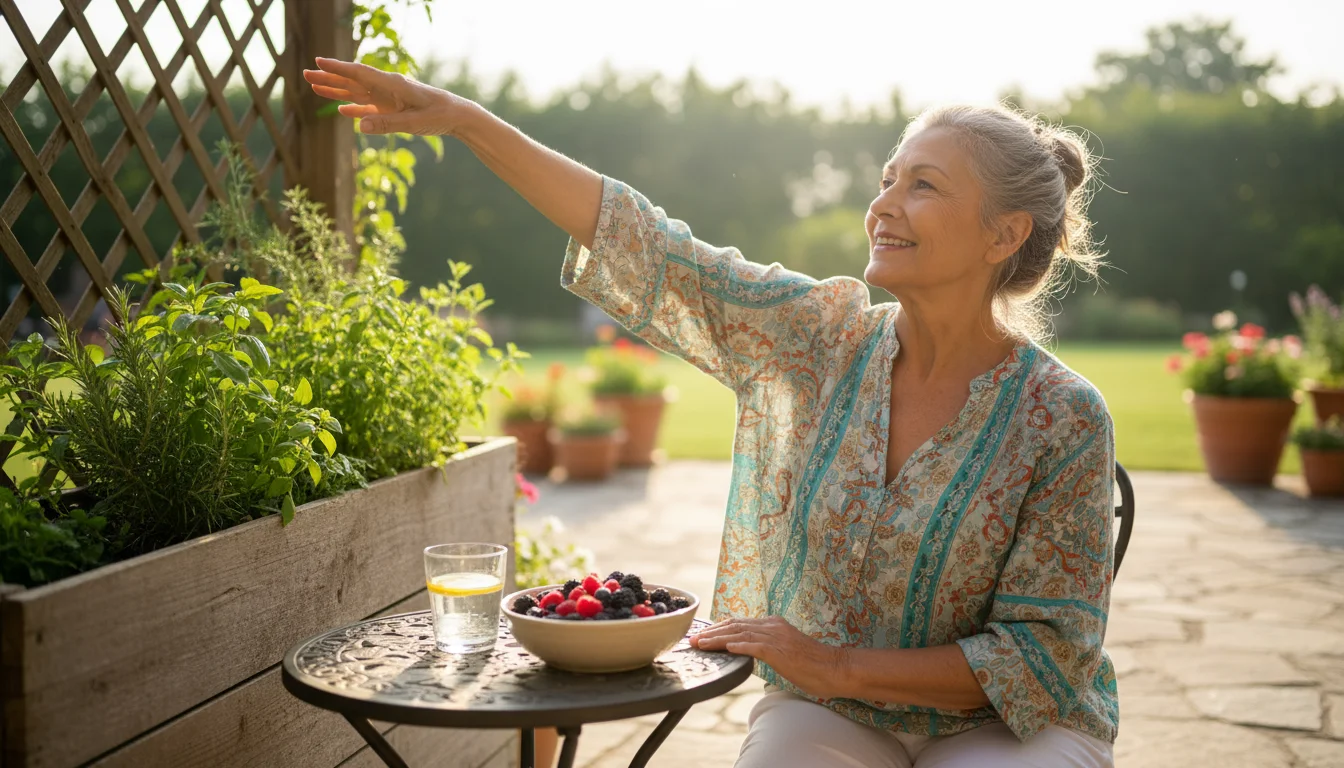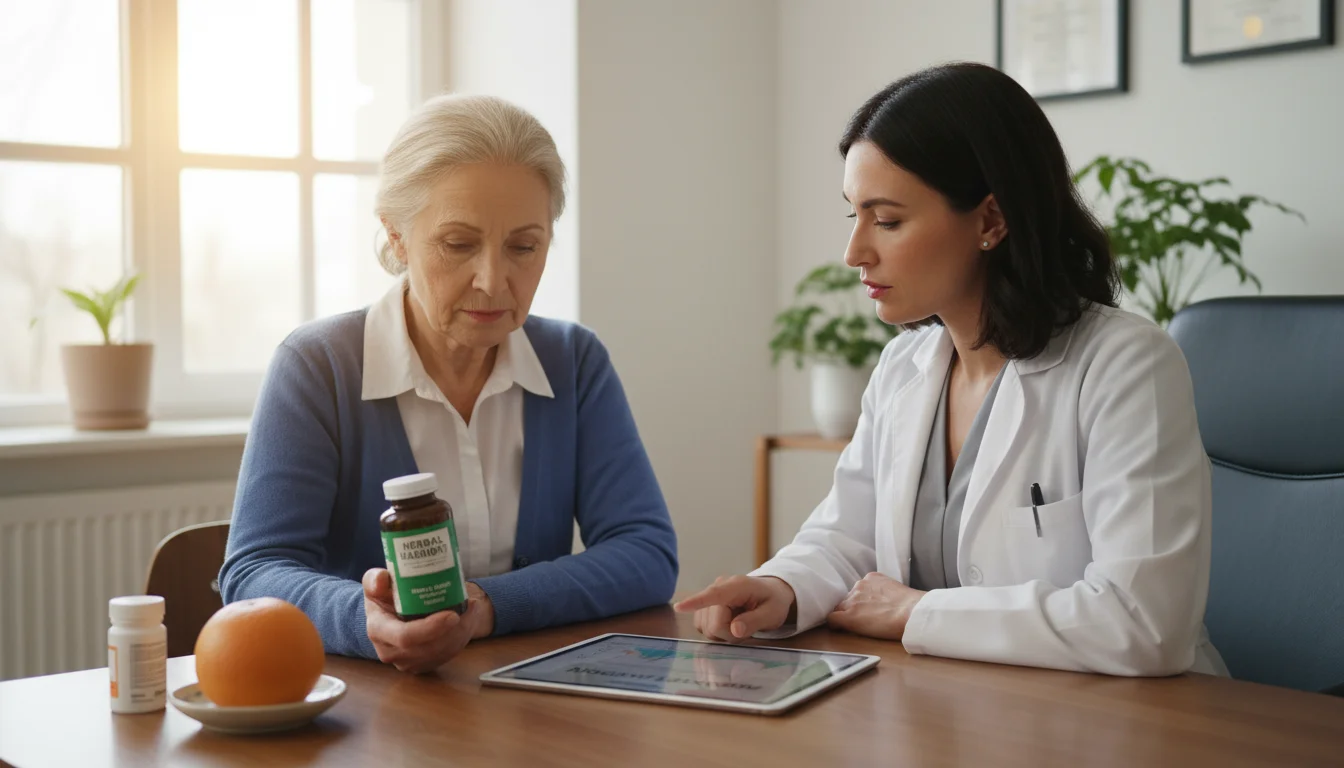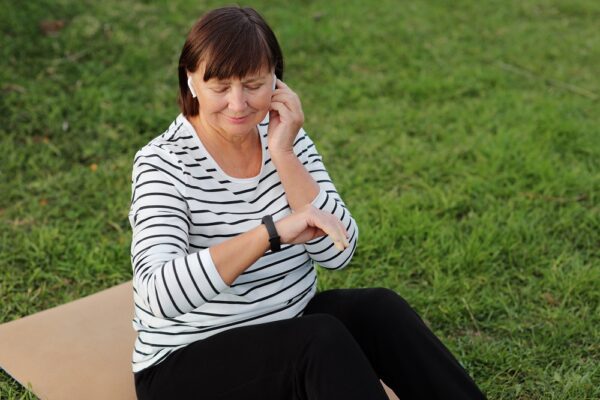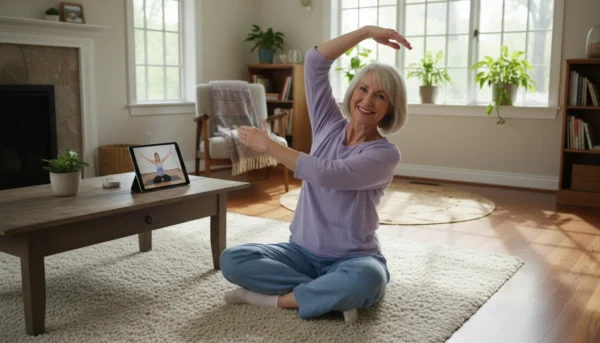

Introduction: Prioritizing Your Health with Natural Energy Boosters
As we age, it’s not uncommon to notice a change in our energy levels. The get-up-and-go we had in our younger years might feel a bit more like “got-up-and-went.” Feeling tired more often can be frustrating, but it doesn’t have to be an accepted part of getting older. Maintaining your energy is key to preserving your independence, enjoying your favorite hobbies, and staying connected with loved ones. It’s about more than just feeling awake; it’s about having the stamina and spirit to live your life to the fullest.
Many factors contribute to a decline in energy, from changes in sleep patterns and metabolism to the side effects of medications or underlying health conditions. While some of these require a doctor’s attention, there are many safe, gentle, and natural ways to support your body’s energy production. This guide is designed to explore practical strategies you can use to enhance your aging vitality. We will focus on simple adjustments to your diet, movement, and daily routines that can make a meaningful difference. Remember, the goal is not to turn back the clock but to help you feel your best right now. As always, our first priority is your health and safety, so we’ll emphasize the importance of speaking with your healthcare provider before making any significant changes to your wellness plan.

Understanding the Health Benefits (and Any Risks)
Adopting natural strategies to boost your energy goes beyond simply shaking off sleepiness. These methods are rooted in holistic well-being, meaning they benefit your entire body and mind. When you focus on fundamentals like nutrition, hydration, and gentle movement, you are supporting the very systems that create and sustain your energy. The benefits are interconnected and can lead to a significant improvement in your overall quality of life.

The Benefits of a Natural Approach
Improved Physical Health: A balanced diet rich in whole foods provides the essential vitamins and minerals your body needs to convert food into usable energy. Gentle, regular exercise strengthens your heart and lungs, improving circulation and oxygen delivery to your cells. This enhanced efficiency means your body doesn’t have to work as hard, preserving your senior energy levels for the activities you enjoy.
Enhanced Mental Clarity: The same practices that boost physical energy also nourish your brain. Proper hydration, for instance, is crucial for cognitive function, helping to prevent the “brain fog” that can make you feel sluggish and unfocused. Nutrients like omega-3 fatty acids and B vitamins, found in fish and leafy greens, are known to support brain health. Furthermore, physical activity has been shown to improve mood and reduce symptoms of anxiety and depression, which can be significant energy drains.
Better Sleep Quality: It may seem counterintuitive, but using energy during the day through light physical activity can help you sleep more soundly at night. A well-rested body is an energized body. By establishing healthy sleep habits, you allow your body the time it needs to repair and rejuvenate, leading to more stable energy throughout the following day.

Understanding the Potential Risks
While the term “natural” often sounds safe, it’s important to approach any new health practice with caution and awareness. Your body is unique, and what works well for one person may not be suitable for another, especially when managing existing health conditions or medications.
Consult Your Doctor First: This is the most important rule. Before starting a new exercise program, changing your diet, or trying any supplement, have a conversation with your doctor or a registered dietitian. They can review your health history and medications to identify any potential conflicts. For example, grapefruit can interfere with certain blood pressure and cholesterol medications, and some herbal supplements can interact with blood thinners. Your doctor’s guidance is essential for your safety.
Start Slow with Exercise: If you’ve been inactive for a while, jumping into an intense exercise routine can lead to injury or exhaustion. The key is to start slowly and gradually increase the duration and intensity. Listen to your body. Mild muscle soreness is normal, but sharp pain is a signal to stop and rest.
Supplements Aren’t Always Benign: The supplement industry is not as strictly regulated as the pharmaceutical industry. A bottle labeled “natural energy booster” could contain ingredients at doses that are not safe for you. Many of these products contain high levels of caffeine or other stimulants that can raise your heart rate and blood pressure. Focusing on whole foods to get your nutrients is almost always a safer and more effective approach.
Authoritative health information for seniors is provided by the National Institute on Aging (NIA) and the Centers for Disease Control and Prevention (CDC).

A Step-by-Step Guide to Boosting Energy Safely
Improving your energy levels is a journey, not a race. By taking small, consistent steps, you can build a routine that supports your vitality for the long term. Here is a practical guide to incorporating safe, energy-boosting habits into your life.

Step 1: Fuel Your Body with an Energizing Diet
The food you eat is your body’s primary source of fuel. Choosing the right kinds of foods can provide a steady stream of energy, while the wrong ones can lead to crashes. Think of it like putting high-quality gasoline in a car for a smooth ride.
- Focus on Whole Foods: Prioritize fruits, vegetables, lean proteins, and whole grains. These foods are packed with the nutrients your body needs. Examples include berries, leafy greens like spinach, chicken or fish, beans, and oatmeal.
- Include Complex Carbohydrates: Unlike sugary snacks that cause a quick spike and crash in blood sugar, complex carbs like whole-wheat bread, brown rice, and quinoa provide sustained energy.
- Don’t Skip Protein: Including a source of protein with every meal helps stabilize blood sugar and keeps you feeling full and energized longer. Good sources include eggs, yogurt, nuts, and lentils.
- Stay Hydrated: Dehydration is a very common cause of fatigue. Aim to sip water throughout the day, even if you don’t feel thirsty. If plain water is unappealing, try infusing it with lemon or cucumber slices.

Step 2: Incorporate Gentle, Regular Movement
Exercise is one of the most effective ways to combat fatigue and improve senior energy levels. It boosts circulation, strengthens your heart, and even releases endorphins, which are natural mood elevators. The key is to choose activities you enjoy and that are appropriate for your fitness level.
- Walking: A simple, accessible, and highly effective exercise. Start with 10-15 minute walks and gradually increase your time as you feel more comfortable. A short walk after a meal can also aid digestion and prevent post-meal sleepiness.
- Chair Yoga: This is a wonderful option for those with mobility or balance concerns. Chair yoga provides the benefits of stretching, breathing, and mindfulness without the need to get on the floor. Look for free videos online or check for classes at your local senior center.
- Tai Chi: Often described as “meditation in motion,” Tai Chi involves slow, flowing movements that improve balance, flexibility, and strength. Its gentle nature makes it an excellent choice for seniors.
Safety First: Always warm up before starting any activity with a few minutes of light stretching. Wear comfortable, supportive shoes, and stop immediately if you feel dizzy, short of breath, or experience any pain.

Step 3: Prioritize Restorative Sleep
Poor sleep is a guaranteed recipe for low energy. Improving your “sleep hygiene”—the habits and environment that contribute to quality sleep—can have a profound impact on how you feel during the day.
- Stick to a Schedule: Try to go to bed and wake up around the same time every day, even on weekends. This helps regulate your body’s internal clock.
- Create a Restful Environment: Make sure your bedroom is dark, quiet, and cool. Consider using blackout curtains or a white noise machine if needed.
- Establish a Wind-Down Routine: In the hour before bed, avoid screens (TVs, phones, tablets) as the blue light can interfere with sleep. Instead, try reading a book, listening to calm music, or taking a warm bath.
- Limit Naps: If you need to nap, try to keep it short (20-30 minutes) and take it earlier in the afternoon to avoid interfering with your nighttime sleep.

Step 4: Manage Stress and Nurture Your Mind
Emotional and mental stress can be just as draining as physical exertion. Finding healthy ways to manage stress is a crucial component of maintaining your aging vitality and pursuing natural health.
- Practice Mindfulness: Spend a few minutes each day simply focusing on your breath. This simple act can calm your nervous system and reduce feelings of overwhelm.
- Connect with Others: Social isolation can contribute to depression and low energy. Make an effort to call a friend, join a club, or participate in community activities.
- Spend Time in Nature: Even a few minutes sitting in a park or tending to a garden can be restorative. Sunlight provides Vitamin D, which is also linked to energy levels.

Key Signs It’s Time to Consult a Doctor
While the natural strategies discussed in this article can be very effective, it is crucial to recognize when fatigue might be a symptom of a more serious, underlying health issue. Do not dismiss persistent or unusual tiredness. Your health and safety are the top priorities, and a medical professional is your best resource for diagnosis and treatment.
Please schedule an appointment with your doctor immediately if you experience any of the following:
- Sudden or Extreme Fatigue: If your tiredness comes on suddenly and is debilitating, making it difficult to perform your normal daily activities, it requires immediate medical attention.
- Fatigue Accompanied by Other Symptoms: Pay close attention if your fatigue is paired with other red flags, such as:
- Chest pain, shortness of breath, or an irregular heartbeat.
- Unexplained weight loss or loss of appetite.
- Fever, body aches, or swollen glands.
- Feeling unusually sad, hopeless, or anxious for more than two weeks.
- Tiredness That Doesn’t Improve with Rest: If you are getting what should be an adequate amount of sleep but still wake up feeling exhausted day after day, it could signal a sleep disorder like sleep apnea or another medical condition.
- Fatigue After Starting a New Medication: If you notice a significant drop in your energy levels shortly after beginning a new prescription, contact your doctor or pharmacist. It may be a side effect that can be managed by adjusting the dosage or trying a different medication.
- Persistent Brain Fog or Confusion: While mild forgetfulness can be normal, if your fatigue is accompanied by significant confusion or difficulty concentrating, it’s important to get it checked out.
These symptoms could indicate conditions such as heart disease, thyroid problems, anemia, diabetes, or depression. A doctor can run the necessary tests to determine the cause and recommend the appropriate treatment. For mental health support, consult the National Institute of Mental Health (NIMH).

Making It a Part of Your Daily Routine
Knowing what to do is one thing; making it a consistent habit is another. The key to long-term success is to integrate these practices into your life in a way that feels manageable and enjoyable. You don’t have to change everything overnight. Small, steady changes are more likely to stick.
- Start with One Thing: Instead of trying to overhaul your diet, exercise, and sleep all at once, pick one area to focus on first. For example, commit to a 10-minute walk every day for a week. Once that feels like a habit, you can add another small change.
- Link New Habits to Old Ones: This technique, called “habit stacking,” can be very effective. For example, if you want to drink more water, you could make a rule to drink a full glass right after you brush your teeth in the morning. The existing habit (brushing your teeth) serves as a reminder for the new one.
- Prepare for Success: Make healthy choices the easy choices. If you want to eat more fruit, keep a bowl of washed apples and bananas on your counter where you can see them. If you plan to walk in the morning, lay out your walking shoes and comfortable clothes the night before.
- Find a Partner: Sharing your goals with a friend or family member can provide motivation and accountability. You could plan walks together or simply check in with each other to share your progress.
- Be Patient and Kind to Yourself: There will be days when you feel less motivated or get off track. That’s perfectly normal. The important thing is not to give up. Acknowledge it, and then get back to your routine the next day. Progress, not perfection, is the goal.

Frequently Asked Questions
1. Are over-the-counter energy supplements or vitamins safe for seniors?
It is essential to be extremely cautious with over-the-counter energy supplements. Many contain high levels of caffeine or other stimulants that can be dangerous for older adults, potentially causing a rapid heart rate, high blood pressure, or anxiety. They can also interfere with prescription medications. You should never take any new supplement without first discussing it with your doctor or pharmacist. They can check for potential drug interactions and may recommend a blood test to see if you have a specific vitamin deficiency (like B12 or iron) that could be safely addressed.
2. How much sleep do adults over 65 really need each night?
Most experts, including those at the National Institute on Aging, recommend that older adults aim for 7 to 8 hours of sleep per night. However, it’s important to focus on the quality of your sleep, not just the quantity. If you sleep for 8 hours but wake up frequently or don’t feel rested, your sleep quality may be poor. If you consistently have trouble sleeping, discuss it with your doctor to rule out underlying issues like sleep apnea or restless legs syndrome.
3. Can my diet truly make a significant difference in my daily energy levels?
Absolutely. Your body converts food directly into the energy it uses for everything from breathing to walking. A diet high in processed foods, sugar, and unhealthy fats can lead to sharp spikes and crashes in blood sugar, leaving you feeling sluggish and tired. In contrast, a balanced diet rich in whole grains, lean proteins, fruits, and vegetables provides a slow, steady release of energy that can keep you feeling vibrant all day long. Think of your body like a car engine—it runs best on clean, high-quality fuel.
4. Does Medicare cover consultations with a nutritionist or dietitian?
This is a great question, as professional dietary advice can be very helpful. Medicare Part B may cover medical nutrition therapy services if you have a diagnosis of diabetes, kidney disease, or have had a kidney transplant within the last 36 months. A doctor must refer you for these services. For other conditions, coverage may vary depending on your specific plan, such as a Medicare Advantage Plan. It’s always best to check directly with your plan provider or visit the official government site for the most accurate information. For insurance and medical coverage questions, refer to Medicare.gov.
Disclaimer: This article is for informational purposes only and does not constitute medical advice. The content is not intended to be a substitute for professional medical advice, diagnosis, or treatment. Always seek the advice of your physician or other qualified health provider with any questions you may have regarding a medical condition.
|
Fact-Checked Content
Our editorial team reviews all content for accuracy and updates it regularly. Learn about our editorial process →
|

















